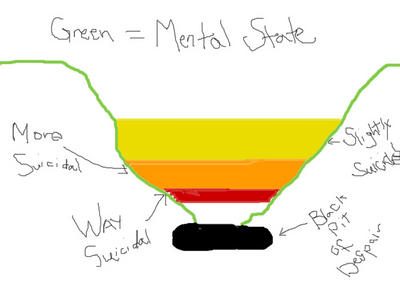Kateri has a link to a particular post on her blog, and I read it today. Andrea's post on her depression made me want to share a conversation I had with my boss. I wanted to tell you all about my thoughts on it (or a particular comment within the post, actually), because I have a slight advantage over the average person. I work with pharmacists, and I can ask them about the little questions that nag at me, without feeling like a prat for hoarding their time.
[Incidentally, the most important thing I've learned about pharmacists in the year I've been working with them is that absolutely every good pharmacist out there wants to help you. They are more than happy to answer any questions you might have regarding your medication, whether you're their customer or not. It's their job, after all, to know all they can about side-effects and counter-indications - it's a joy to them to be asked to share their expertise. I can't tell you how many people there are out there who don't even care to know the names of their medication, and having people care enough to ask important questions really makes us feel good.]
One question I asked my pharmacist a few months back was regarding Prozac. I had read some recent studies saying that Prozac was shown to cause a slight increase in suicidal thoughts in some cases, and I wanted to get to the bottom of it. Obviously, it's alarming.
So, anyway, S was happy to answer my question. From what I understand, Prozac (and other anti-depressants in the same class - Prozac has been around longer than the other medications, and therefore naturally the most studies have been done using that particular drug) has been shown, in some cases, to cause an occurrence of suicidal thoughts in young people.
More specifically, however, when a person first starts taking an anti-depressant, they're often so far into the [black pit of despair] that they have moved beyond the point on the slope where they have enough energy or ambition to even think about something as monumental as suicide. There is a small percentage of people who start an anti-depressant after they've gotten too depressed to even have fantasies about killing themselves. The theory is that when these severely depressed people begin taking the medication, their mental state has to go past the point where they have enough energy to think about suicide before they can reach the point of [not feeling depressed anymore].
In short, anti-depressants don't work immediately, and it's a gradual [ascending] from feeling severely depressed to feeling [quote]normal[/quote]. For some people too depressed to think about suicide, the medication has to bring them back past the point where they are depressed with energy (and perhaps thinking of killing themselves) in stages, before eventually making them feel less crippled by this horrible disease.
I thought I'd draw y'all a diagram (if the picture isn't offending, perhaps my attempt at making it humorous will be):

So there you have it, my thoughts (and the thoughts of a registered pharmacist of the state of Missouri) on why Prozac (and other similar anti-depressants) might cause young depressed people to have more suicidal thoughts than they were having previously.
Oh, and as a side note: I don't believe that any (new) anti-depressant should be given without supervision of some sort. Whether it's a psycologist or a family doctor or a watchful family makes no difference to me, as long as they are informed of warning signs. Actually, that pretty much goes for any new medication, as well.
1 comment:
I need more diagrams in my life...
Post a Comment